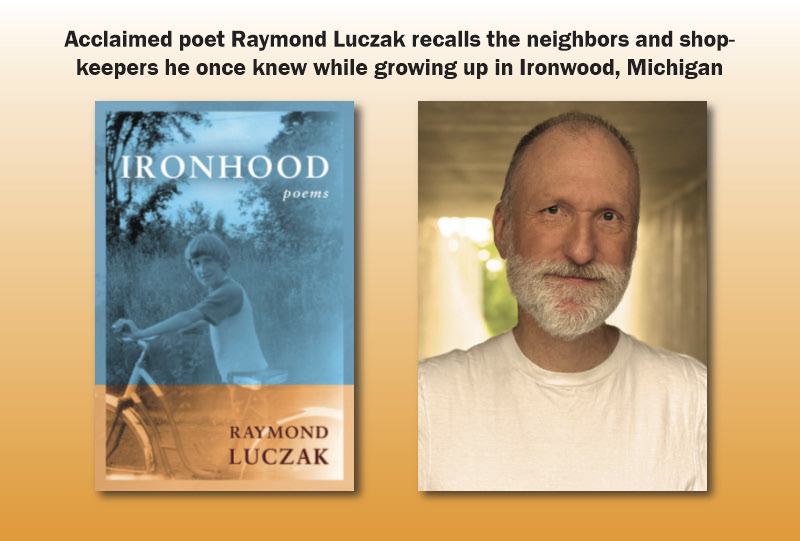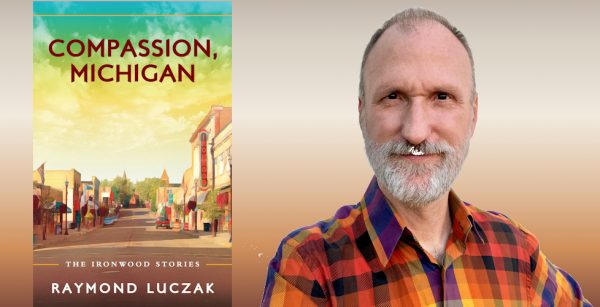Author Interviews
Ironhood – Raymond Luczak on Poetry and Memories of Upper Peninsula
Over the weekend, Modern History Press published acclaimed poet, playwright, and author Raymond Luczak’s latest poetry book Ironhood. UPPAA announced the release of the book and wrote:
In Luczak’s Ironhood, readers get to see, hear, and feel the small town scene of the Upper Peninsula through the eyes of a Deaf, gay child in his formative years. Memories of growing up in a working-class town convey a unique blend of hardship, estrangement, and resilience.
RTS is thrilled to share the following Q&A with Raymond Luczak about his new book.
Ironhood is described as a memoir-in-poems. What drew you to poetry, rather than prose, to tell this story of growing up in Ironwood?
If I wrote these stories as prose, I’d have felt compelled to explain more as in a conventional memoir. The more compelling power of poetry comes from its act of concision. I have to tell more with fewer words, and as a result, I enable the reader to laser-focus on the salient details only. Putting a collection of poems comprising a memoir of sorts often requires putting a lot of faith in the reader in making the connections between such poems and seeing its larger story.
Many of the poems capture a sense of estrangement—of being Deaf, gay, and poor in a small town. How did writing these poems help transform those experiences into resilience?
If I wanted to survive, I had no other choice but to endure. Survival simply meant waiting in limbo; waiting for something conclusive to push me one way or another. I was simply waiting and observing without realizing that I had been indeed observing so much! Even though I had read many library books about the world out there, I never saw myself living “out there.” My world was firmly in the U.P. I didn’t know of any other, so I never felt I had options. I didn’t visit my first metropolitan city (Minneapolis) until I was 15 years old! By then I had begun to wonder if I was meant to live forever in the U.P. but I had no clue if or how that would happen. College turned out to be my ticket out of the U.P. and changed everything. I was suddenly a world of possibilities!
The book is deeply rooted in place. How has the Upper Peninsula continued to shape your writing even after leaving Ironwood?
You know what some folks have said: Once a Yooper, always a Yooper. I think this is particularly true in my case. The U.P. was where I had spent my most formative years, so of course it’s very much in my blood. At the time, though, I didn’t quite understand what was happening to me or to my family or to my town. Things just happened, but most of the time I’d never examined the whys. When I write about my years in the U.P. now, I’m finally examining those whys.
What do you hope readers unfamiliar with the U.P. take away from Ironhood?
I hope that they will recognize something of themselves in the stories I’ve shared in Ironhood. It’s been said that the more specific you are in your writing, the more universal you become. While I’m no William Faulkner who’s managed to create a fascinating universe with Yoknapatawpha County, I have been finding that the more I focus on Ironwood and the U.P. in my writing, the more I am creating a very specific place trapped in time. Almost everyone I’ve written about in Ironhood is dead. In that sense, Ironhood is a book of elegies, a paean of sorts to a certain bygone era. I am remembering so many faces, so many places; it is occasionally odd how and what I’ve chosen to remember, which can be unexpectedly jarring when I visit Ironwood now. The Ironwood of today is very different from the Ironwood I grew up in, so I often get flashbacks when I see a place that is no longer there.
You’ve written across genres—memoir, fiction, drama. How does poetry allow you to explore memory differently?
Poetry requires concision; less is often more. All the extraneous details, which will usually feel as such in the nakedness of a poem, need to be pruned away. For example, in my poem “Charles (‘Chuck’) Lewinski,” I don’t talk about his wife Evelyn at all. There was absolutely no need to bring her into the picture; if she was there in the poem, the piece would’ve felt lugubrious and unfocused when the story was really about that one time Chuck and I had actually interacted in a weird but meaningful way. In order for a poem to be considered good, it should have had the weight of each word considered, the meter of its syllables worked out, the flow of its lines feeling unstoppable until the very end. Likewise with memory. It is not enough to simply remember; it is far more important to examine the why that I’ve forgotten it. Such whys are the secret to making a piece of writing that much better.
Can you talk about the balance between truth, memory, and imagination in writing autobiographical poetry?
It’s terribly important to be emotionally truthful when exploring lived experiences. Maybe one cannot always recall the precise facts, but emotional truth does matter. When people read poetry, they aren’t looking for factual reports, but they do want to experience emotional truth of whatever the poet is saying. Otherwise the writing may risk turning maudlin and meaningless.
Visit https://www.raymondluczak.com/ to see more of Raymond Luczak’s work in literature and film.








